Examining Anti-Competitive Practices and Monopolies Under UK Law
VerifiedAdded on 2023/04/04
|12
|907
|402
Report
AI Summary
This report provides an overview of monopolies and anti-competitive practices legislation in the UK, focusing on the Competition Act 1998 and the Enterprise Act 2002. It discusses the roles of the Competition Commission and the UK Office of Fair Trading (now merged with the Competition and Market Authority) in regulating competition and investigating mergers. The report also examines the concept of dominant position within the EU common market, using the United Brands case as an example, and outlines EU exemptions to potentially anti-competitive practices, including individual, block, and parallel exemptions. The document concludes with a list of references.
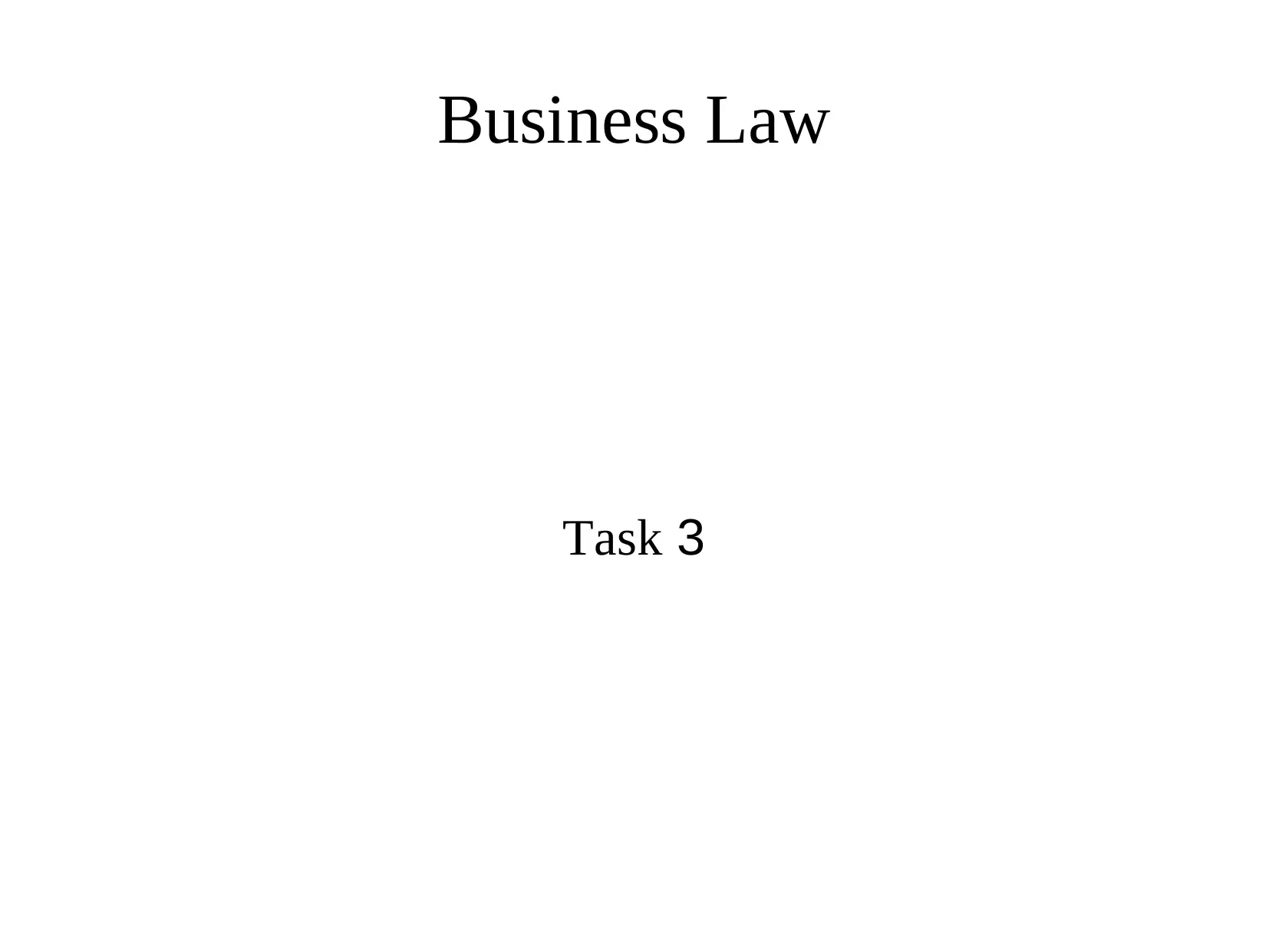
Business Law
Task 3
Task 3
Paraphrase This Document
Need a fresh take? Get an instant paraphrase of this document with our AI Paraphraser
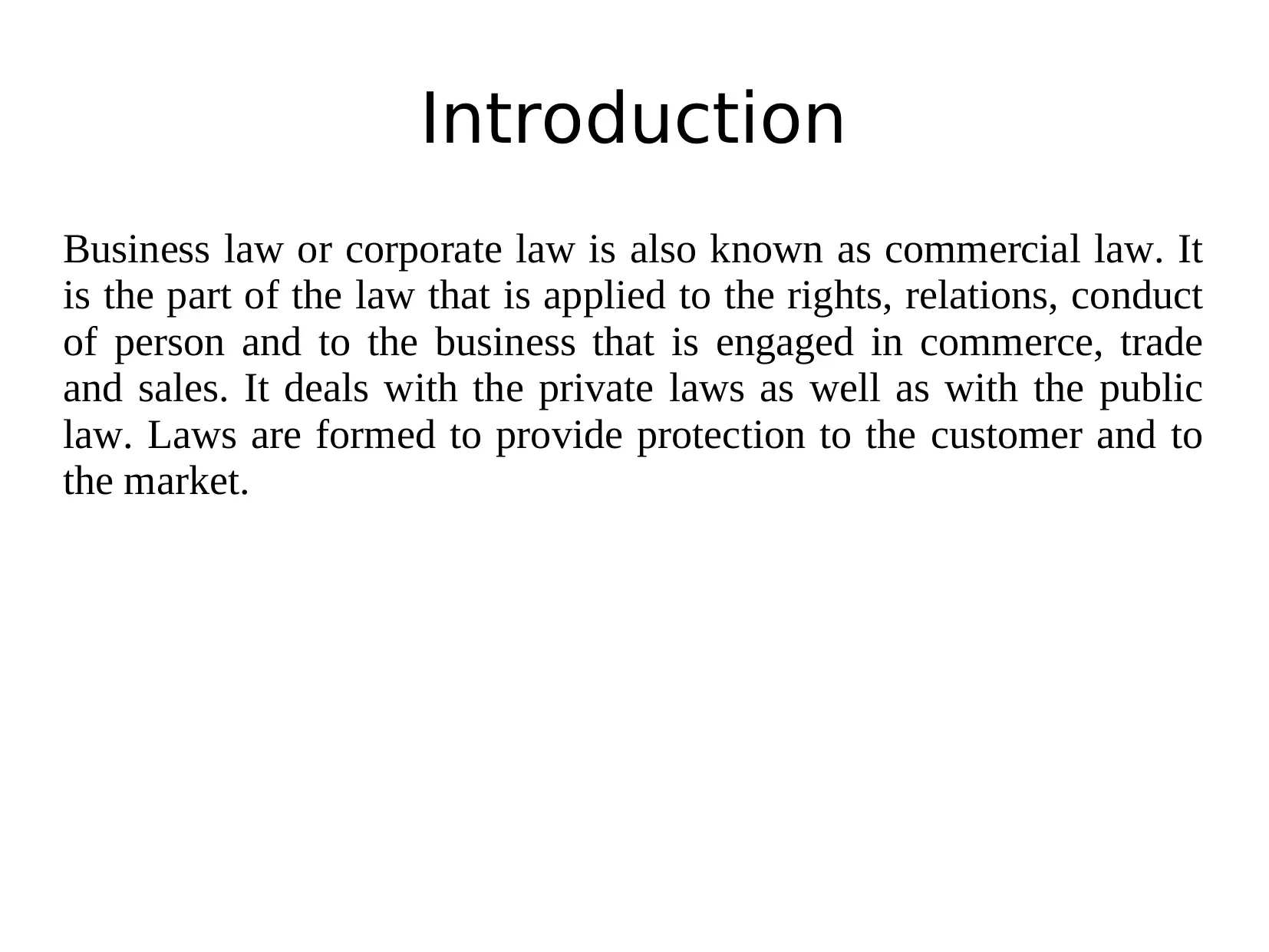
Introduction
Business law or corporate law is also known as commercial law. It
is the part of the law that is applied to the rights, relations, conduct
of person and to the business that is engaged in commerce, trade
and sales. It deals with the private laws as well as with the public
law. Laws are formed to provide protection to the customer and to
the market.
Business law or corporate law is also known as commercial law. It
is the part of the law that is applied to the rights, relations, conduct
of person and to the business that is engaged in commerce, trade
and sales. It deals with the private laws as well as with the public
law. Laws are formed to provide protection to the customer and to
the market.
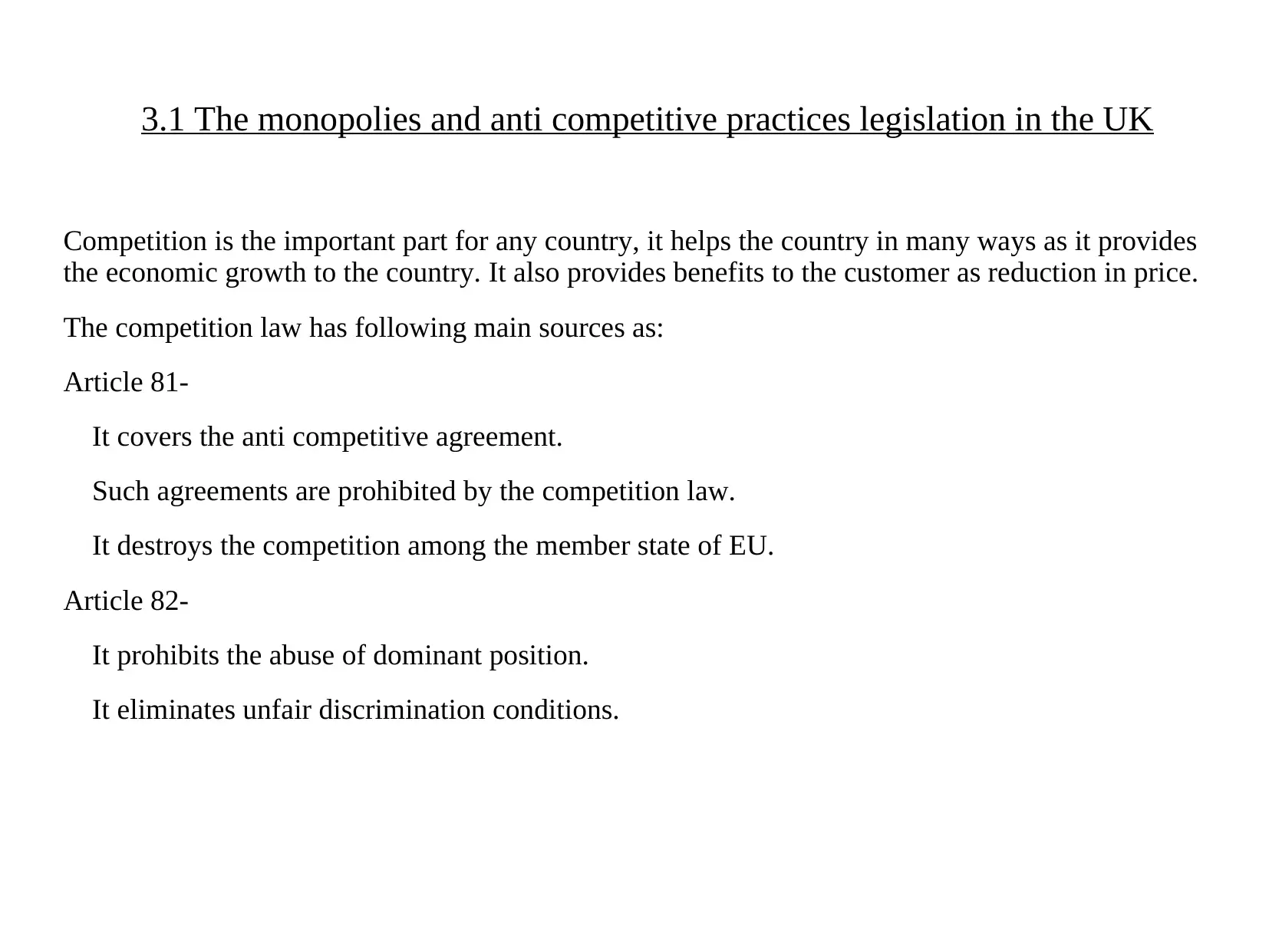
3.1 The monopolies and anti competitive practices legislation in the UK
Competition is the important part for any country, it helps the country in many ways as it provides
the economic growth to the country. It also provides benefits to the customer as reduction in price.
The competition law has following main sources as:
Article 81-
It covers the anti competitive agreement.
Such agreements are prohibited by the competition law.
It destroys the competition among the member state of EU.
Article 82-
It prohibits the abuse of dominant position.
It eliminates unfair discrimination conditions.
Competition is the important part for any country, it helps the country in many ways as it provides
the economic growth to the country. It also provides benefits to the customer as reduction in price.
The competition law has following main sources as:
Article 81-
It covers the anti competitive agreement.
Such agreements are prohibited by the competition law.
It destroys the competition among the member state of EU.
Article 82-
It prohibits the abuse of dominant position.
It eliminates unfair discrimination conditions.
⊘ This is a preview!⊘
Do you want full access?
Subscribe today to unlock all pages.

Trusted by 1+ million students worldwide
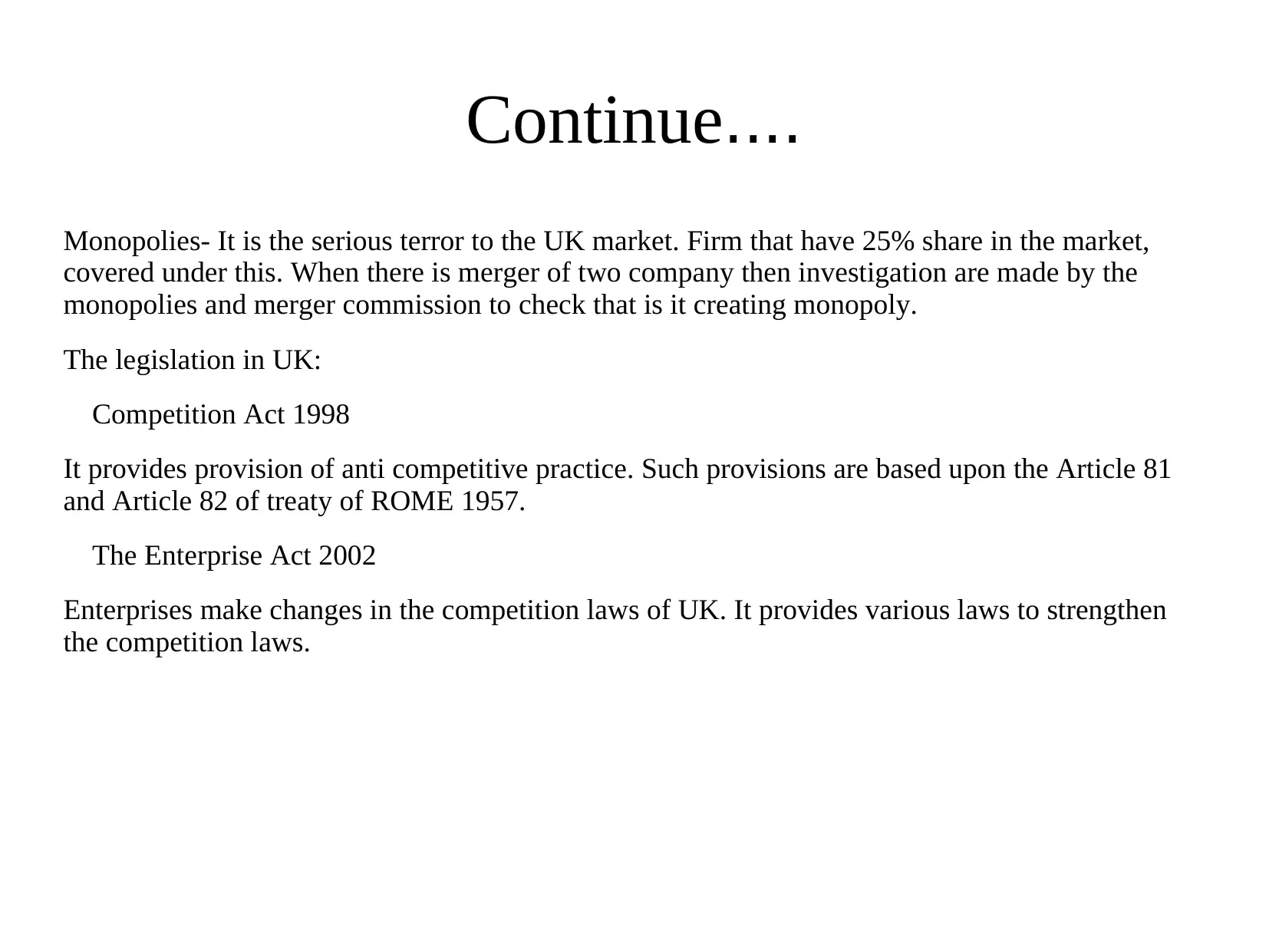
Continue....
Monopolies- It is the serious terror to the UK market. Firm that have 25% share in the market,
covered under this. When there is merger of two company then investigation are made by the
monopolies and merger commission to check that is it creating monopoly.
The legislation in UK:
Competition Act 1998
It provides provision of anti competitive practice. Such provisions are based upon the Article 81
and Article 82 of treaty of ROME 1957.
The Enterprise Act 2002
Enterprises make changes in the competition laws of UK. It provides various laws to strengthen
the competition laws.
Monopolies- It is the serious terror to the UK market. Firm that have 25% share in the market,
covered under this. When there is merger of two company then investigation are made by the
monopolies and merger commission to check that is it creating monopoly.
The legislation in UK:
Competition Act 1998
It provides provision of anti competitive practice. Such provisions are based upon the Article 81
and Article 82 of treaty of ROME 1957.
The Enterprise Act 2002
Enterprises make changes in the competition laws of UK. It provides various laws to strengthen
the competition laws.
Paraphrase This Document
Need a fresh take? Get an instant paraphrase of this document with our AI Paraphraser
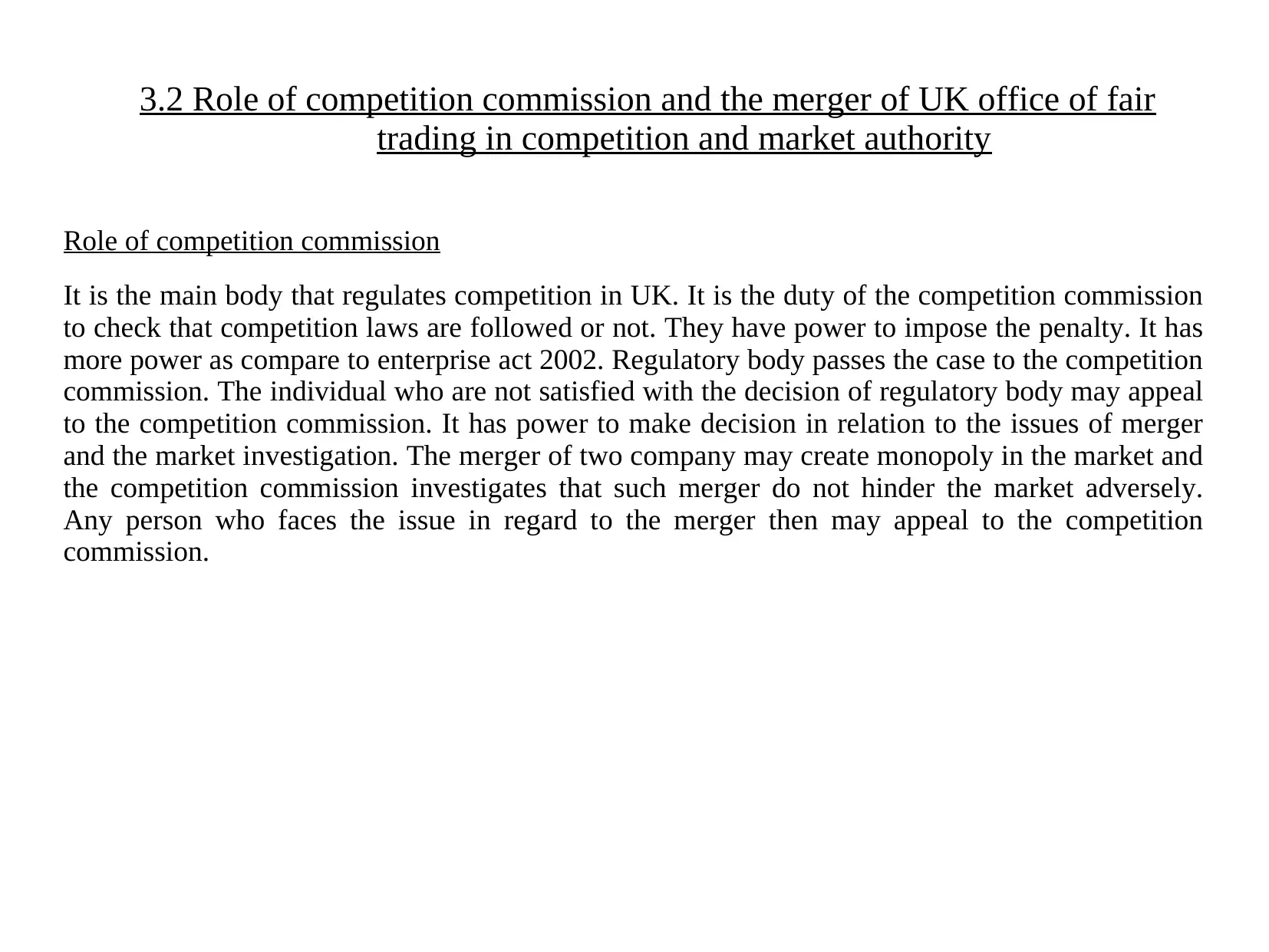
3.2 Role of competition commission and the merger of UK office of fair
trading in competition and market authority
Role of competition commission
It is the main body that regulates competition in UK. It is the duty of the competition commission
to check that competition laws are followed or not. They have power to impose the penalty. It has
more power as compare to enterprise act 2002. Regulatory body passes the case to the competition
commission. The individual who are not satisfied with the decision of regulatory body may appeal
to the competition commission. It has power to make decision in relation to the issues of merger
and the market investigation. The merger of two company may create monopoly in the market and
the competition commission investigates that such merger do not hinder the market adversely.
Any person who faces the issue in regard to the merger then may appeal to the competition
commission.
trading in competition and market authority
Role of competition commission
It is the main body that regulates competition in UK. It is the duty of the competition commission
to check that competition laws are followed or not. They have power to impose the penalty. It has
more power as compare to enterprise act 2002. Regulatory body passes the case to the competition
commission. The individual who are not satisfied with the decision of regulatory body may appeal
to the competition commission. It has power to make decision in relation to the issues of merger
and the market investigation. The merger of two company may create monopoly in the market and
the competition commission investigates that such merger do not hinder the market adversely.
Any person who faces the issue in regard to the merger then may appeal to the competition
commission.
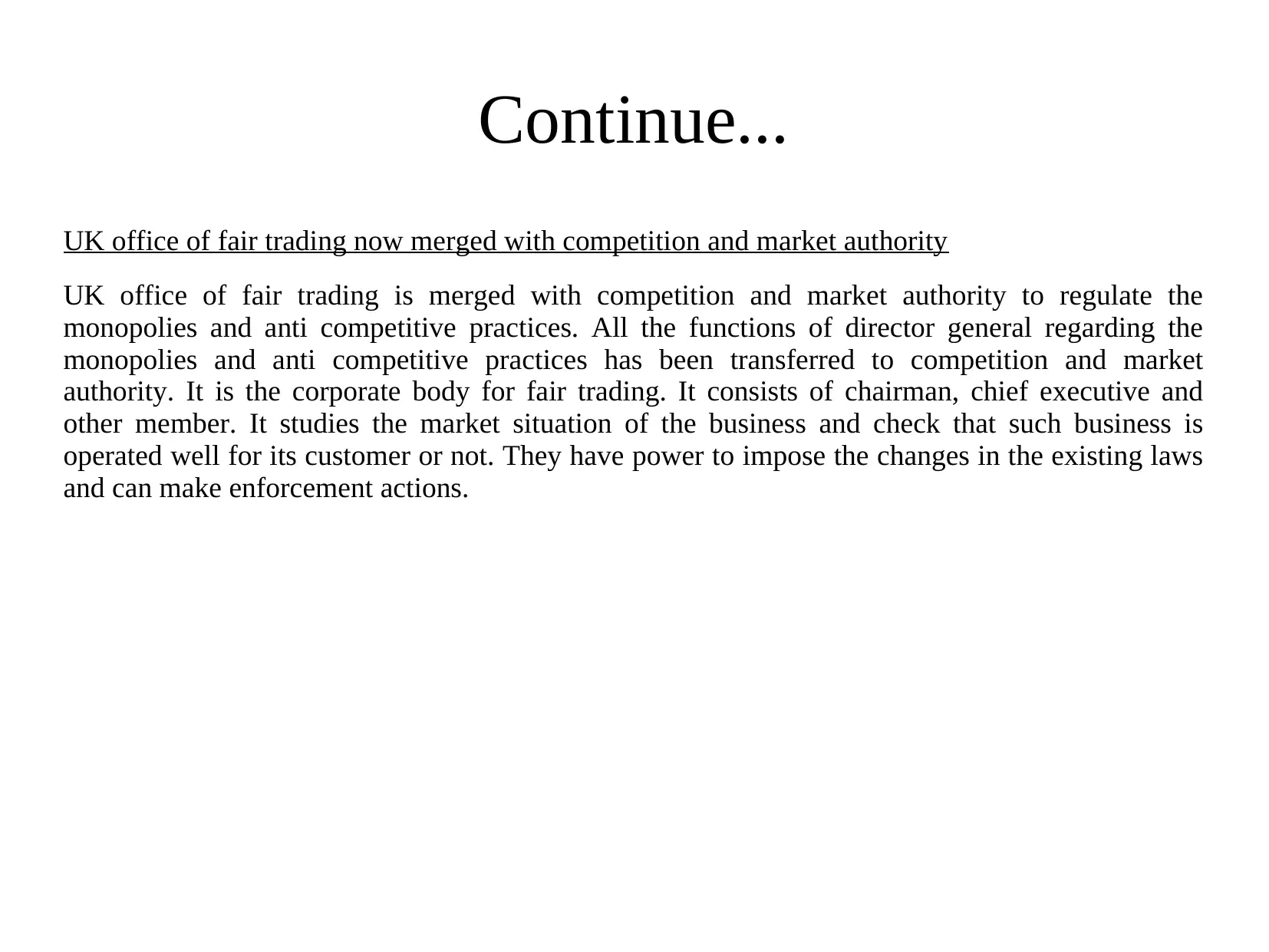
Continue...
UK office of fair trading now merged with competition and market authority
UK office of fair trading is merged with competition and market authority to regulate the
monopolies and anti competitive practices. All the functions of director general regarding the
monopolies and anti competitive practices has been transferred to competition and market
authority. It is the corporate body for fair trading. It consists of chairman, chief executive and
other member. It studies the market situation of the business and check that such business is
operated well for its customer or not. They have power to impose the changes in the existing laws
and can make enforcement actions.
UK office of fair trading now merged with competition and market authority
UK office of fair trading is merged with competition and market authority to regulate the
monopolies and anti competitive practices. All the functions of director general regarding the
monopolies and anti competitive practices has been transferred to competition and market
authority. It is the corporate body for fair trading. It consists of chairman, chief executive and
other member. It studies the market situation of the business and check that such business is
operated well for its customer or not. They have power to impose the changes in the existing laws
and can make enforcement actions.
⊘ This is a preview!⊘
Do you want full access?
Subscribe today to unlock all pages.

Trusted by 1+ million students worldwide
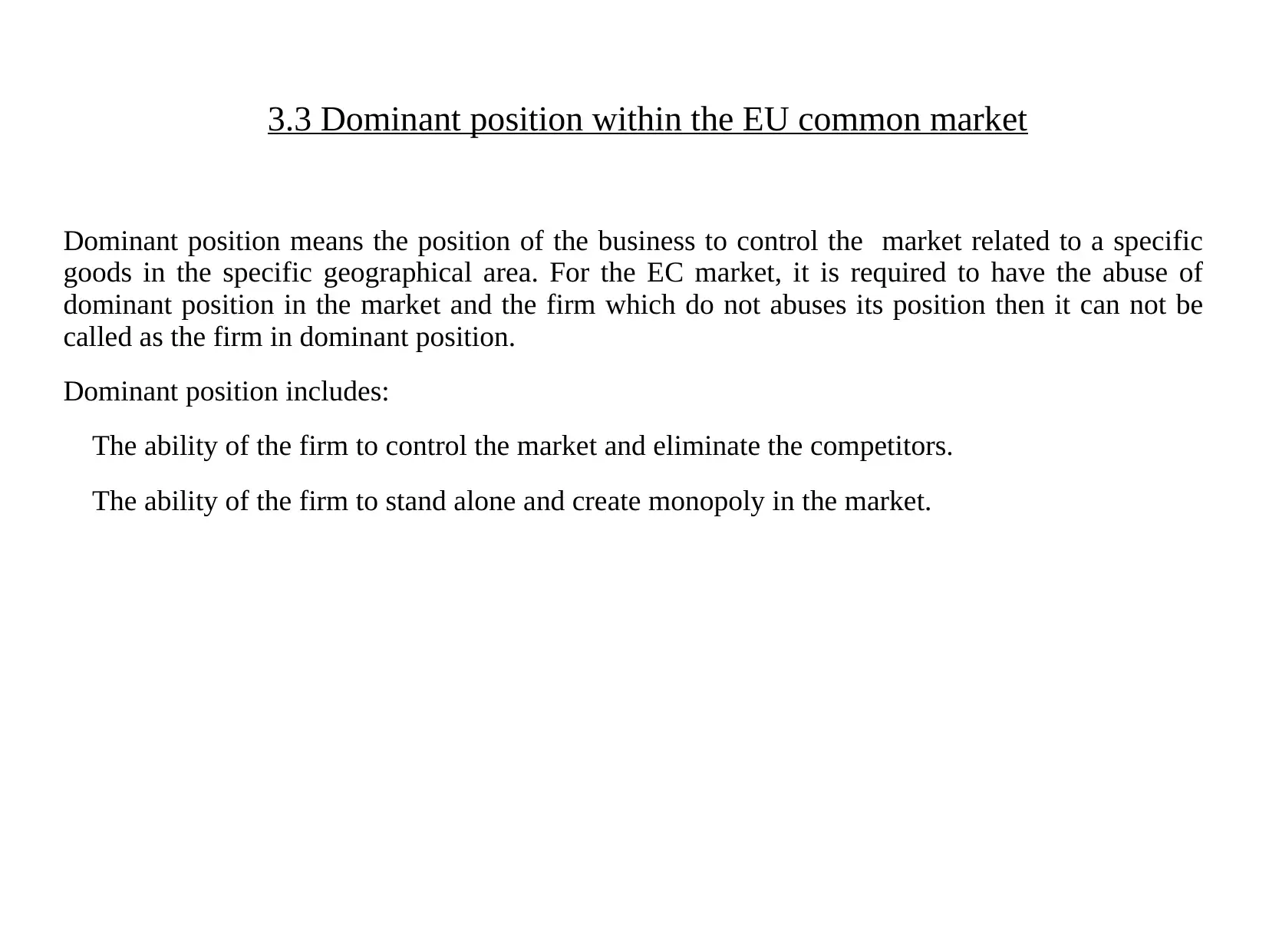
3.3 Dominant position within the EU common market
Dominant position means the position of the business to control the market related to a specific
goods in the specific geographical area. For the EC market, it is required to have the abuse of
dominant position in the market and the firm which do not abuses its position then it can not be
called as the firm in dominant position.
Dominant position includes:
The ability of the firm to control the market and eliminate the competitors.
The ability of the firm to stand alone and create monopoly in the market.
Dominant position means the position of the business to control the market related to a specific
goods in the specific geographical area. For the EC market, it is required to have the abuse of
dominant position in the market and the firm which do not abuses its position then it can not be
called as the firm in dominant position.
Dominant position includes:
The ability of the firm to control the market and eliminate the competitors.
The ability of the firm to stand alone and create monopoly in the market.
Paraphrase This Document
Need a fresh take? Get an instant paraphrase of this document with our AI Paraphraser
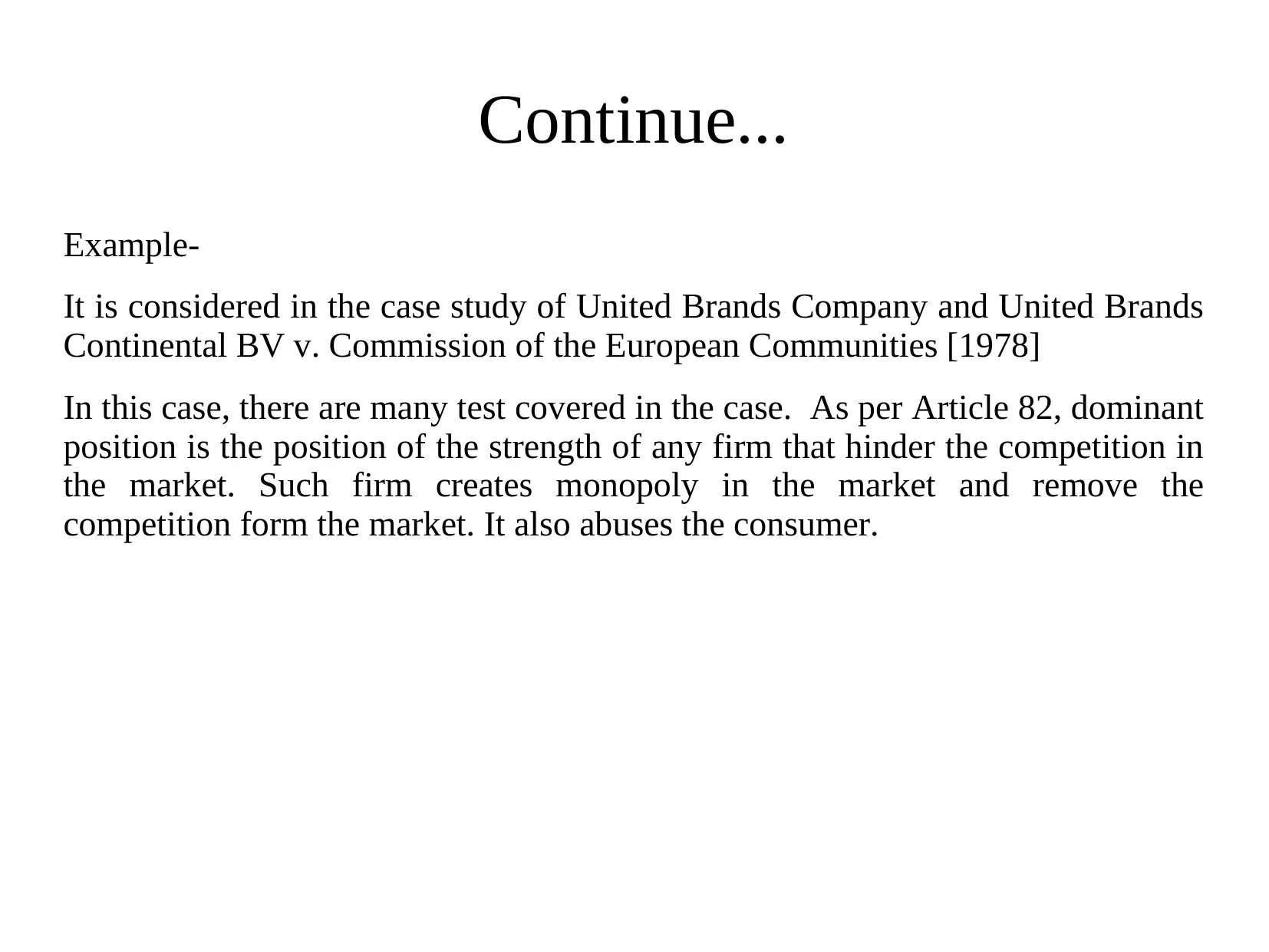
Continue...
Example-
It is considered in the case study of United Brands Company and United Brands
Continental BV v. Commission of the European Communities [1978]
In this case, there are many test covered in the case. As per Article 82, dominant
position is the position of the strength of any firm that hinder the competition in
the market. Such firm creates monopoly in the market and remove the
competition form the market. It also abuses the consumer.
Example-
It is considered in the case study of United Brands Company and United Brands
Continental BV v. Commission of the European Communities [1978]
In this case, there are many test covered in the case. As per Article 82, dominant
position is the position of the strength of any firm that hinder the competition in
the market. Such firm creates monopoly in the market and remove the
competition form the market. It also abuses the consumer.
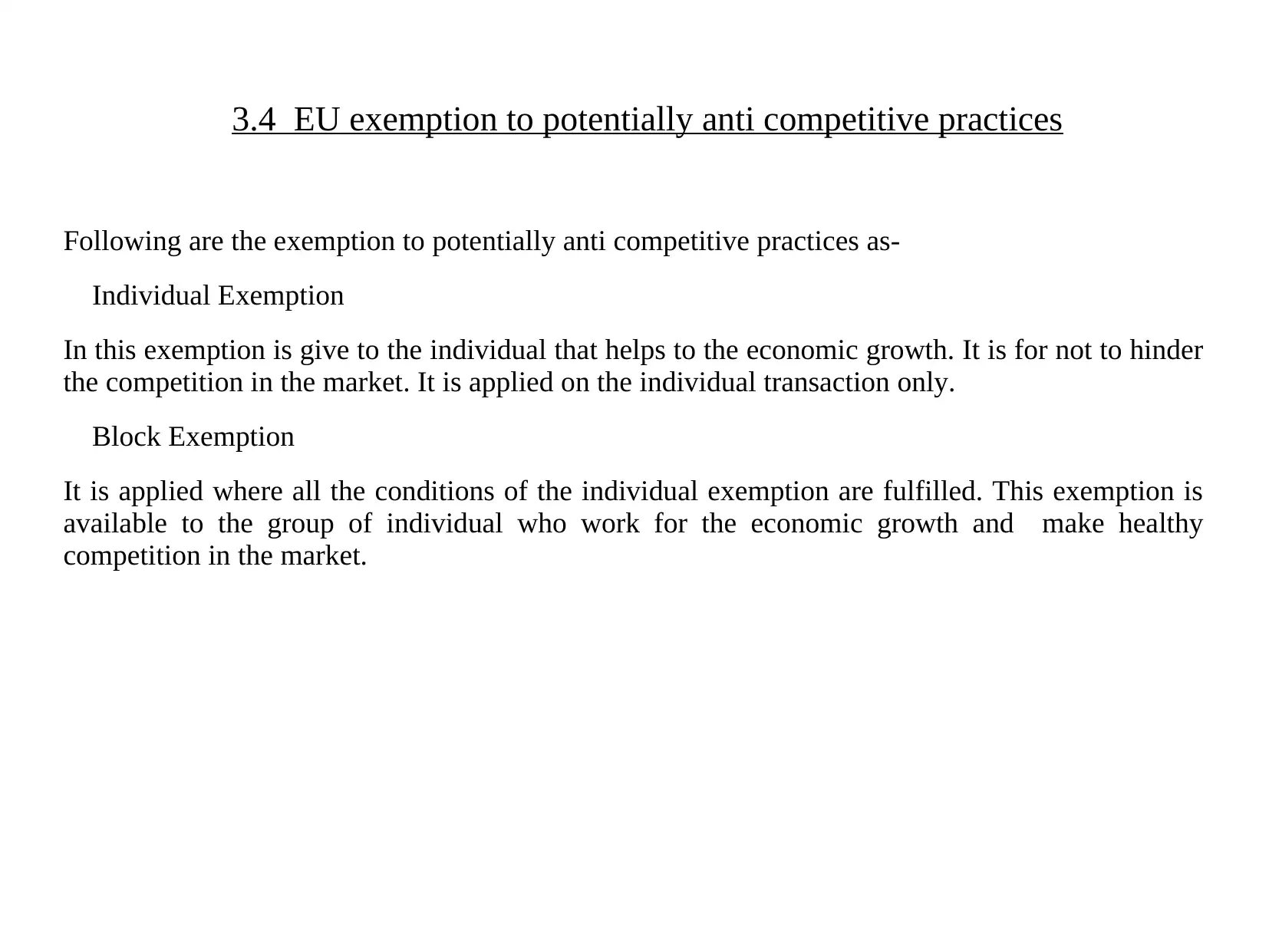
3.4 EU exemption to potentially anti competitive practices
Following are the exemption to potentially anti competitive practices as-
Individual Exemption
In this exemption is give to the individual that helps to the economic growth. It is for not to hinder
the competition in the market. It is applied on the individual transaction only.
Block Exemption
It is applied where all the conditions of the individual exemption are fulfilled. This exemption is
available to the group of individual who work for the economic growth and make healthy
competition in the market.
Following are the exemption to potentially anti competitive practices as-
Individual Exemption
In this exemption is give to the individual that helps to the economic growth. It is for not to hinder
the competition in the market. It is applied on the individual transaction only.
Block Exemption
It is applied where all the conditions of the individual exemption are fulfilled. This exemption is
available to the group of individual who work for the economic growth and make healthy
competition in the market.
⊘ This is a preview!⊘
Do you want full access?
Subscribe today to unlock all pages.

Trusted by 1+ million students worldwide
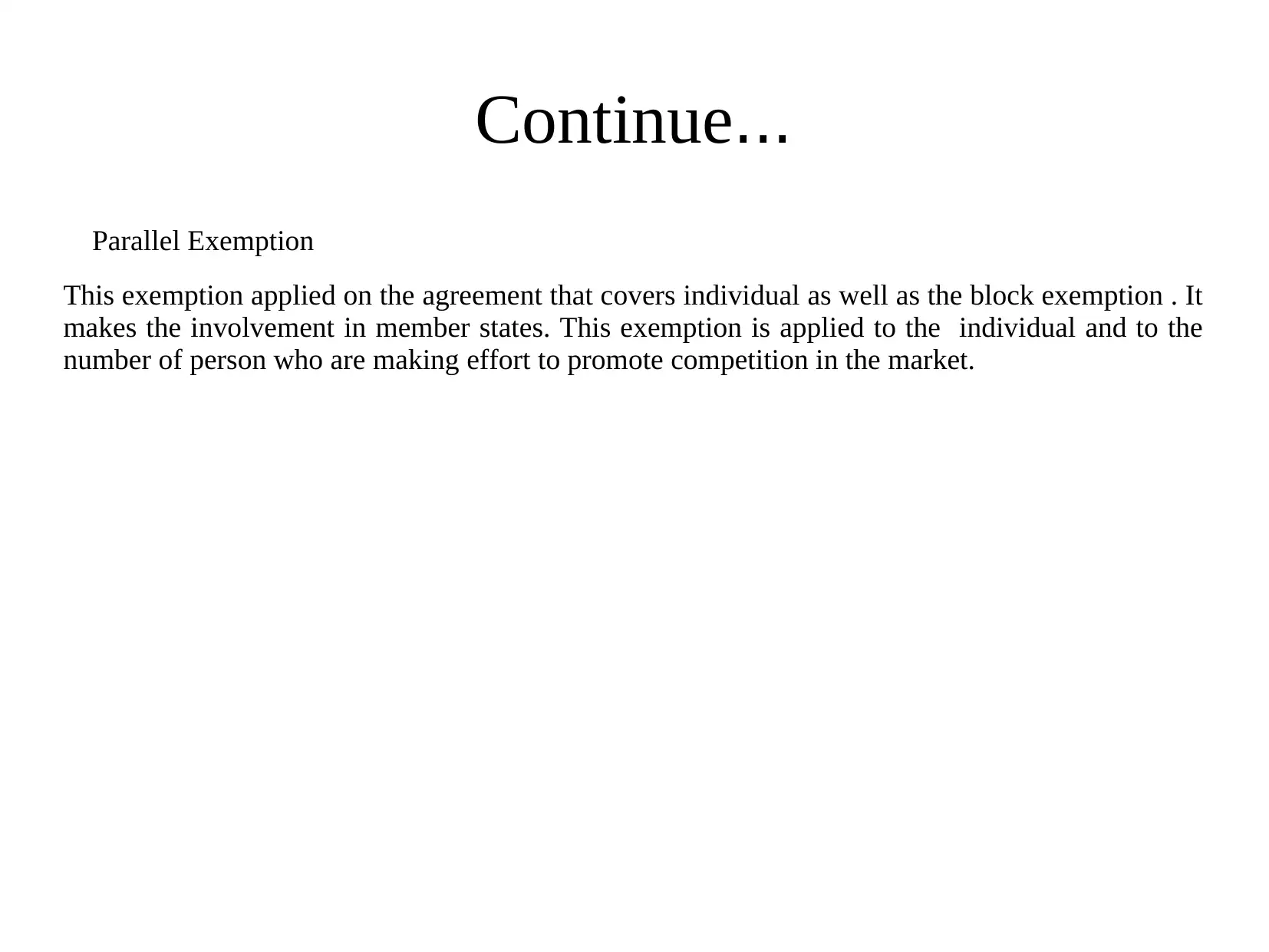
Continue...
Parallel Exemption
This exemption applied on the agreement that covers individual as well as the block exemption . It
makes the involvement in member states. This exemption is applied to the individual and to the
number of person who are making effort to promote competition in the market.
Parallel Exemption
This exemption applied on the agreement that covers individual as well as the block exemption . It
makes the involvement in member states. This exemption is applied to the individual and to the
number of person who are making effort to promote competition in the market.
Paraphrase This Document
Need a fresh take? Get an instant paraphrase of this document with our AI Paraphraser
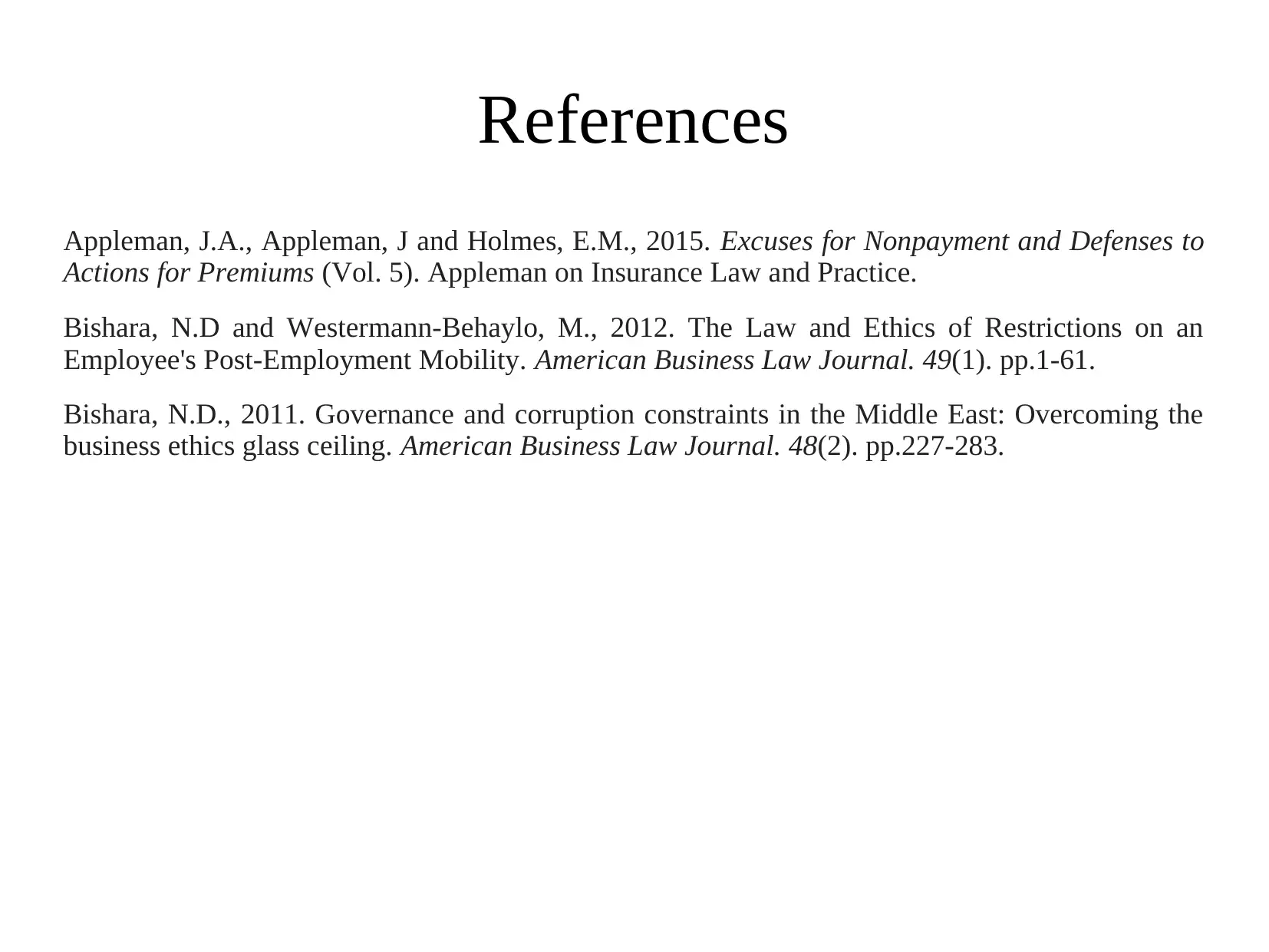
References
Appleman, J.A., Appleman, J and Holmes, E.M., 2015. Excuses for Nonpayment and Defenses to
Actions for Premiums (Vol. 5). Appleman on Insurance Law and Practice.
Bishara, N.D and Westermann‐Behaylo, M., 2012. The Law and Ethics of Restrictions on an
Employee's Post‐Employment Mobility. American Business Law Journal. 49(1). pp.1-61.
Bishara, N.D., 2011. Governance and corruption constraints in the Middle East: Overcoming the
business ethics glass ceiling. American Business Law Journal. 48(2). pp.227-283.
Appleman, J.A., Appleman, J and Holmes, E.M., 2015. Excuses for Nonpayment and Defenses to
Actions for Premiums (Vol. 5). Appleman on Insurance Law and Practice.
Bishara, N.D and Westermann‐Behaylo, M., 2012. The Law and Ethics of Restrictions on an
Employee's Post‐Employment Mobility. American Business Law Journal. 49(1). pp.1-61.
Bishara, N.D., 2011. Governance and corruption constraints in the Middle East: Overcoming the
business ethics glass ceiling. American Business Law Journal. 48(2). pp.227-283.

⊘ This is a preview!⊘
Do you want full access?
Subscribe today to unlock all pages.

Trusted by 1+ million students worldwide
1 out of 12
Related Documents
Your All-in-One AI-Powered Toolkit for Academic Success.
+13062052269
info@desklib.com
Available 24*7 on WhatsApp / Email
![[object Object]](/_next/static/media/star-bottom.7253800d.svg)
Unlock your academic potential
Copyright © 2020–2026 A2Z Services. All Rights Reserved. Developed and managed by ZUCOL.





